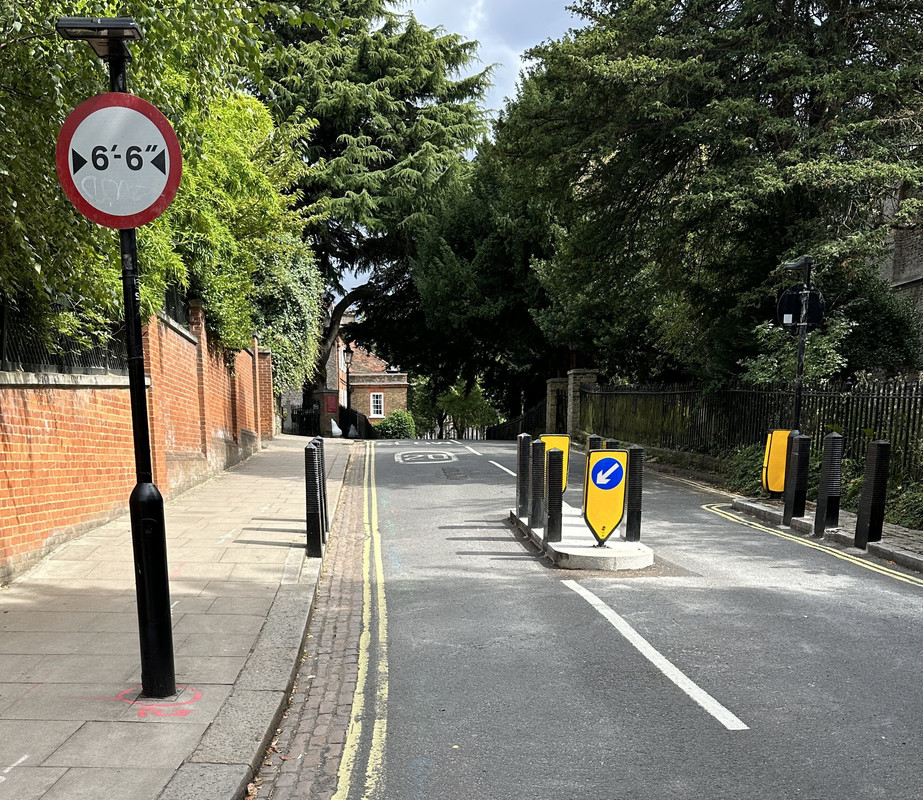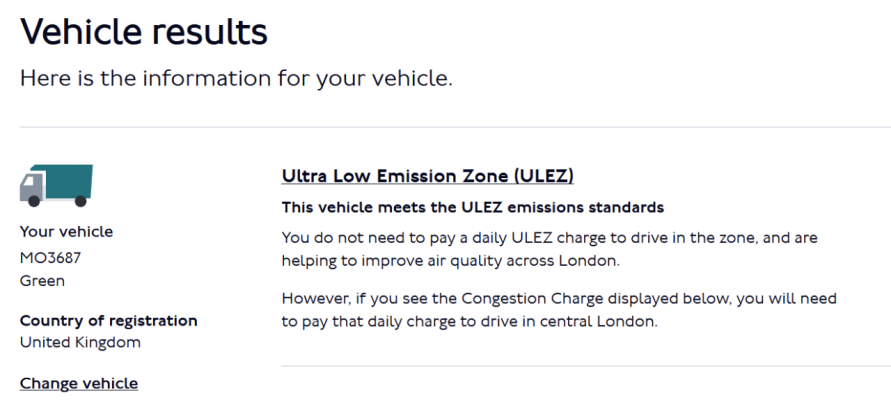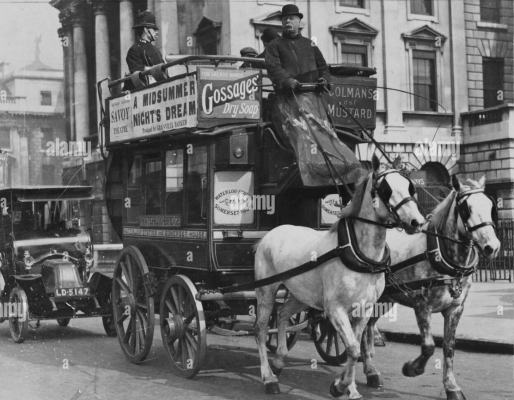Navigation
Install the app
How to install the app on iOS
Follow along with the video below to see how to install our site as a web app on your home screen.
Note: This feature may not be available in some browsers.
More options
Whats your strategy for year 2030 / ban of ICE vehicles?
- Thread starter Riva811
- Start date
I agree it's crazy ; no daily entrance charge ( which could be limited to just a few a year ) ; instead a £60 and increasing fine each time a non compliant and non exempt vehicle is taken in ; and this will soon be in four cities , I think Edinburgh gets it next , Dundee later and Aberdeen sometime later as well .I'm sorry, Glasgow is a unique square mile of lunacy.
London isn't anywhere near banning ICE. It's raising several hundred million a year for Sadiq's next reelection run, but it's not banning private vehicles any time soon.
View attachment 146535
At least the people in your picture will have no such worries , but I think there should still be a steam traction engine parade past Westminster to protest ; and they would all need to stop on Westminster bridge and drop their hoses to take on water , however long that might take .
Not sure how brave JSO would be walking slowly in front of a steamroller , with the driver completely unable to see them in front ?
- Joined
- Jun 24, 2008
- Messages
- 50,869
- Location
- London
- Car
- 2022 Hyundai IONIQ 5 RWD / 2016 Suzuki Vitara AWD
I haven't seen a residential road closed to HGVs , after all the dutbin lorry is one , as are delivery trucks and building supplies lorries - many roads are , however unsuitable or impractical for such vehicles , yet we still meet them on country lanes when they have been to farms , or their GPS tells the driver to go that way .
Well down here in London we have width restriction bollards almost everywhere.... preventing HGVs from bypassing the main roads by cutting through residential neighbourhoods. Possibly you don't have this issue in Scotland, I don't know.


Police officers in uniform always used to get free travel on buses and trains - seen as a way of keeping order as they were never off duty .
Never seen it , but how on earth do the bins get emptied , or if you order a tonne of sand or some paving slabs from the builders merchants ; or are building a house ... how do these vehicles get in ? what about the fire brigade ? all these vehicles need access .Well down here in London we have width restriction bollards almost everywhere.... preventing HGVs from bypassing the main roads by cutting through residential neighbourhoods. Possibly you don't have this issue in Scotland, I don't know.
- Joined
- Jun 24, 2008
- Messages
- 50,869
- Location
- London
- Car
- 2022 Hyundai IONIQ 5 RWD / 2016 Suzuki Vitara AWD
Never seen it , but how on earth do the bins get emptied , or if you order a tonne of sand or some paving slabs from the builders merchants ; or are building a house ... how do these vehicles get in ? what about the fire brigade ? all these vehicles need access .
No idea, but it has been like this for decades.
In some areas, access is for permit holders only.
Possibly there's a route in-and-out at the other side which can be used for access only but not for passing though, and requires a permit - I don't drive a rubbish truck so have no idea...
But clearly the streets showing in my photos are inaccessible to HGVs. We have dozens - if not hundreds - of these in London.
I genuinely have never seen anything like that in either Glasgow or Edinburgh ; we do have a few Fire Bridges which are raised bits of road that ordinary cars cannot go across , but a fire engine could ( I rather suspect many 4x4s would have no bother either , nor would HGVs ) .No idea, but it has been like this for decades.
In some areas, access is for permit holders only.
Possibly there's a route in-and-out at the other side which can be used for access only but not for passing though, and requires a permit - I don't drive a rubbish truck so have no idea...
But clearly the streets showing in my photos are inaccessible to HGVs. We have dozens - if not hundreds - of these in London.
MikeInWimbledon
Hardcore MB Enthusiast
- Joined
- Nov 8, 2014
- Messages
- 14,478
- Car
- SL350 (Ex S211 E500,W212 E500, C216, S212E500, W211E500 5.5, W221S500, S211 E500, SL500, S500, E55)
Completely understood.Here in Scotland , my one friend who was an early adopter of Tesla ( and traded in his Jaaag when they offered a good deal ) has a home charger ( it was paid for by Scottish Government , along with his six year interest free loan to buy the vehicle ) but always charges half a mile down the road in the public park , because here in Scotland all public charge points ( the one in local authority car parks , not private ones ) are free , which was another SG initiative as part of the 'Greener Scotland' plan . Together with the huge numbers of windfarms on our hills , hydro electric schemes and our one remaining nuclear power station , we seem to have plenty of electricity ( not that this clean , and mostly free , energy seems to be bringing my electricity bill down any ) . While there will always be people who cannot have home chargers because they have to park on street ; there are many who do , but still charge at work , in public car parks , at railway stations , in supermarket car parks etc etc because it actually costs them less to do so .
The Scottish taxpayer's generosity is greatly admired. (One could ask why they don't prioritise money towards resolving drug and alcohol addiction, but that's for another day.
My point was aimed at those who "think" that EV's need huge amounts of charging support all over the country, when the sad reality is that normally they're charged at home, at work, in public car parks, or on the street.
Even in leafy Malvern, where they say there aren't many chargers yet, people do have driveways and lampposts where EV's will be charged, when there's enough of them around to have justified installing chargers yet.
SpikyMikey
MB Enthusiast
- Joined
- Nov 4, 2020
- Messages
- 9,441
- Location
- The Sunny South Coast
- Car
- BMW F31 330i LCI M Sport Shadow Edition AMG Black Series Touring
This sort of thing was one of the reasons I never bought a van bigger than a VW Transporter; you could get a T4 through a 6'6" restriction (without having to breathe in!) which allowed me to run up Beddington Lane and across Commonside instead of sitting in the traffic on the A23 between Croydon and Mitcham (amongst others)Well down here in London we have width restriction bollards almost everywhere.... preventing HGVs from bypassing the main roads by cutting through residential neighbourhoods. Possibly you don't have this issue in Scotland, I don't know.


Bellow
Hardcore MB Enthusiast
Because what they see is a lack of parking made available by their employer? Eg, when Arnold Clark took charge of the MB dealership in Aberdeen the first change was to exclude its employees from on-site parking. Should they change their employer? Say yes but don't complain when the dealership you need parts from is either understaffed or closed. I suspect most retail outlets are similarly inclined to exclude employer parking on-site.Why is it that people can't get their heads around Brits charging their EV's at home, starting off with fully, and cheaply, charged EV's potentially every day, but certainly on every occasion that they're travelling a significant distance?
Why can't folks see that company car parks will have charging points for their wage slaves?
This is in all likelihood deeply unappealing to many. It is to me. When I go out and have to use a car for that purpose, I do not want to have to faff about waiting for a refuel. I want to crack on with whatever it is I intended. If I wanted a burger - I'd go for a burger. I'd sooner get home at a reasonable time and eat healthily when I do. Home charging - or on-street very close to home - is the bare minimum that is acceptable and isn't ubiquitous or pending. Note, this is day to day stuff I'm referring to. Not whether a 20 minute stop using a superfast charger is acceptable or not during a twice annual trip of several hundred miles while on holiday.That Supermarkets and other organisations with regular customer visits will be installing chargers so that people can top up while having a beer or a burger? Or so that someone can just pop into the pub car park one morning to top up because they're 150 miles away from home?
Was it not the case that a host was expected to feed and water a visiting guests horses? Should I install a home charger for that very purpose?Are we just stuck in that London Bus mind set of still having bus routes that start and finish at places that used to be convenient stops to water and change the horses?
- Joined
- Jun 24, 2008
- Messages
- 50,869
- Location
- London
- Car
- 2022 Hyundai IONIQ 5 RWD / 2016 Suzuki Vitara AWD
(One could ask why they don't prioritise money towards resolving drug and alcohol addiction, but that's for another day)
Warning: OT post
That would be a total waste of money.
The amount spent since the 70s by consecutive US administrations on combating drug trafficking into the US from Central and South America would have been sufficient to colonise all hospitable planets in the solar system (there aren't many), find cure for most terminal illnesses, and invent free energy. Spending money of fighting substance abuse has been one of humanity's worst investments.
ChipChop
MB Enthusiast
I can spot 3 non complaint old vehicles in that photo. The Suzuki Supercarry? mini van and the two old white Vauxhall Astras. Maybe they are rarely driven or perhaps the owners know routes that avoid Khan's network of enforcement cameras.Well down here in London we have width restriction bollards almost everywhere.... preventing HGVs from bypassing the main roads by cutting through residential neighbourhoods. Possibly you don't have this issue in Scotland, I don't know.

Suppose Londoners who own motorhomes taxed as private HGV's have no choice but to fork out for storage somewhere outside of the M25. Still at least there are some compliant HGV options if you get creative.


MikeInWimbledon
Hardcore MB Enthusiast
- Joined
- Nov 8, 2014
- Messages
- 14,478
- Car
- SL350 (Ex S211 E500,W212 E500, C216, S212E500, W211E500 5.5, W221S500, S211 E500, SL500, S500, E55)
Car dealerships have always had insufficient parking for their customers. It's the nature of the business.Because what they see is a lack of parking made available by their employer? Eg, when Arnold Clark took charge of the MB dealership in Aberdeen the first change was to exclude its employees from on-site parking. Should they change their employer?
The point that I made was the broader point of the literally millions of Brits who are lucky enough to have parking onsite at work, even in this day and age.
MikeInWimbledon
Hardcore MB Enthusiast
- Joined
- Nov 8, 2014
- Messages
- 14,478
- Car
- SL350 (Ex S211 E500,W212 E500, C216, S212E500, W211E500 5.5, W221S500, S211 E500, SL500, S500, E55)
It's great to hear that you only want to park at home and never park at the supermarket, pub, restaurant, or cinema. But that's hardly "normal." Look around you. Vast tracts of car parking, everywhere, that can host very simple charging points.This is in all likelihood deeply unappealing to many. It is to me. When I go out and have to use a car for that purpose, I do not want to have to faff about waiting for a refuel.
You may not ever park away from home for as much as thirty minutes - long enough to charge an EV to 80% - but most do find they do that, particularly on that one occasion in 20 charges when they're more than 100 miles away from home, so need a few minutes charge to top up enough to get them back home.
Obviously most try to never use a charger away from home. Why would you when your home charger is so cheap?
Bellow
Hardcore MB Enthusiast
Under JR Weirs ownership, on-site parking was permitted. Under Arnold Clark's - no. The benevolence of the employer is required - hardly a given.Car dealerships have always had insufficient parking for their customers. It's the nature of the business.
Luck.....The point that I made was the broader point of the literally millions of Brits who are lucky enough to have parking onsite at work, even in this day and age.
For anyone (many) who can't charge at home, at work, or on the street - hanging about in public car parks is all that is available. One step up from hanging around on street corners.My point was aimed at those who "think" that EV's need huge amounts of charging support all over the country, when the sad reality is that normally they're charged at home, at work, in public car parks, or on the street.
MikeInWimbledon
Hardcore MB Enthusiast
- Joined
- Nov 8, 2014
- Messages
- 14,478
- Car
- SL350 (Ex S211 E500,W212 E500, C216, S212E500, W211E500 5.5, W221S500, S211 E500, SL500, S500, E55)
You've forgotten that the US Economy has been the primary beneficiary of the South American drugs trade.Warning: OT post
That would be a total waste of money.
The amount spent since the 70s by consecutive US administrations on combating drug trafficking into the US from Central and South America would have been sufficient to colonise all hospitable planets in the solar system (there aren't many), find cure for most terminal illnesses, and invent free energy. Spending money of fighting substance abuse has been one of humanity's worst investments.
That global distribution business is denominated in US dollars, and banked in US dollars, and is fundamental to the economy of Miami and the main "offshore" poorly regulated US banking centres.
There's no financial advantage in combatting the illegal drugs trade with South America. Like legalising drugs globally, it would be a massive hit to the US economy.
Bellow
Hardcore MB Enthusiast
Space there - but no additional time. What am I supposed to do while waiting? When others are waiting for me to arrive.It's great to hear that you only want to park at home and never park at the supermarket, pub, restaurant, or cinema. But that's hardly "normal." Look around you. Vast tracts of car parking, everywhere, that can host very simple charging points.
When my customers are happy to provide me with access to charging facilities then I can do what you propose. But parking at Tesco (say) and walking to and around industrial estates with 160kg of goods to deliver isn't going to work for me. Nor do they stay late to allow for me wasting time stopped recharging and chewing burgers - or what ever other enterprise I'm expected to shove time with.You may not ever park away from home for as much as thirty minutes - long enough to charge an EV to 80%
As per earlier - it's my day to day I'm referring to - not holidaying.- but most do find they do that, particularly on that one occasion in 20 charges when they're more than 100 miles away from home, so need a few minutes charge to top up enough to get them back home.
And without a home charger - none of what I am alluding to is even possible - irrespective of mere inconvenience.Obviously most try to never use a charger away from home. Why would you when your home charger is so cheap?
MikeInWimbledon
Hardcore MB Enthusiast
- Joined
- Nov 8, 2014
- Messages
- 14,478
- Car
- SL350 (Ex S211 E500,W212 E500, C216, S212E500, W211E500 5.5, W221S500, S211 E500, SL500, S500, E55)
Are you saying that these Brits are driving their vehicles 24/7, or that these vehicles are only "hanging around on street corners?"For anyone (many) who can't charge at home, at work, or on the street - hanging about in public car parks is all that is available. One step up from hanging around on street corners.
The average vehicle in the UK only does 8,000 miles a year. Broadly, means that 17 million vehicles are driven less than five hours a week. Where's the issue in not having enough time to charge them, while parked?
MikeInWimbledon
Hardcore MB Enthusiast
- Joined
- Nov 8, 2014
- Messages
- 14,478
- Car
- SL350 (Ex S211 E500,W212 E500, C216, S212E500, W211E500 5.5, W221S500, S211 E500, SL500, S500, E55)
So, how many days a week do you drive more than 300 miles in a day?Space there - but no additional time. What am I supposed to do while waiting? When others are waiting for me to arrive.
When my customers are happy to provide me with access to charging facilities then I can do what you propose. But parking at Tesco (say) and walking to and around industrial estates with 160kg of goods to deliver isn't going to work for me. Nor do they stay late to allow for me wasting time stopped recharging and chewing burgers - or what ever other enterprise I'm expected to shove time with.
As per earlier - it's my day to day I'm referring to - not holidaying.
And without a home charger - none of what I am alluding to is even possible - irrespective of mere inconvenience.
That's to say, far enough to use up the charge that you would put into your car between ending one day and starting another?
Bellow
Hardcore MB Enthusiast
Answer the question for yourself. At some point this evening, drive to any car park with an EV charger and sit there for an hour. While you're there, compile a list of all the things you could be doing and would rather be doing. At least I've actually given you something to do while there. Don't you value your time?Are you saying that these Brits are driving their vehicles 24/7, or that these vehicles are only "hanging around on street corners?"
The average vehicle in the UK only does 8,000 miles a year. Broadly, means that 17 million vehicles are driven less than five hours a week. Where's the issue in not having enough time to charge them, while parked?
Users who are viewing this thread
Total: 1 (members: 0, guests: 1)

